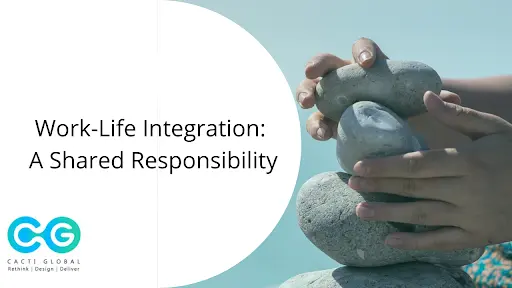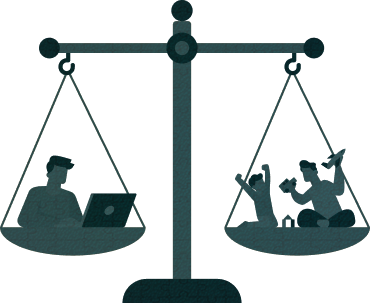In the past two years, the definitions of work and life have gone through an exceptional transformation. As noted by Outlook, employers have experienced disruptions ranging from “The Great Reshuffle” to “Moonlighting,” but one thing that has become stronger is employees wanting a job where they can achieve work-life balance.
This change in employees’ checklist is a result of blurring boundaries between work and life, and how they influence each other. Remote working took away the privilege to just switch off the office, on top of that tools such as chats, emails, etc. act as a bane with an expectation to be ‘always’ available. This catapulted ‘work-life balance’ to the forefront of employees’ expectations.
On the brighter side, many employees have also found a way to weave together work and life. This is why we choose to call it work-life integration. Employees and employers must understand that productivity is not a constant. Hence on some days, employees will be more productive on others they will be devoting more time to their personal tasks. Similarly, on some days, the workload would be more, on others, it would be barely anything. The only thing that should matter is the result. As Mehezabin Dordi, Clinical Psychologist of Rehabilitation and Sports Medicine Department at Sir HN Reliance Foundation Hospital quotes in a Hindustan Times article “to be realistic” when talking about work-life integration.
Once both parties start to look at work-life integration as an aggregate instead of something that needs to be gained daily, it becomes easier to achieve it.
How?
- Because every day is not the same, and hence every person’s efficiency will also differ from day to day. Which in turn is influenced by many moving parts, out of which a major factor is personal lives.
- When you start to integrate work and life, you take away the notion that work is supposed to be not fun. A positive attitude improves employees’ efficiency adding to the bottom line.
- It prevents employees from feeling guilty when on some days they work more and are unable to give time to their family/ other commitments, or when on other days they work less. Simultaneously when employers allow employees to work less on some days, they will not mind working more on other days.
When employees and employers understand that work is not about having to sit in front of your laptop for a set number of hours rather it is about the effectiveness and results, the attitude towards the job and people’s boundaries changes.
Work-life integration will translate into different things for different people, ranging from having time to pursue hobbies, being able to take care of children or the elderly to being able to travel while working. But then how to make sure that everyone is able to achieve quality work-life balance when there is a considerable amount of subjectivity attached?
Well, make work-life integration a team project, in other words, share the responsibility, communicate and find a common ground. As Samantha Ettus quotes in How We Can Actually Improve Our Work-Life Balance — for Good, “It’s a lot like dating. If you’re not upfront about what your needs are, then you’re probably going to end up in a bad relationship.”
How can employers do their part?
- Company cultures are built by looking at them from a top-down approach. When managers respect their own boundaries, people will learn to respect each other’s boundaries as well, simultaneously it will convey a message that this is the norm for every person in the organization.
For example: When someone has blocked their calendar for lunchtime, ensuring not to schedule a meeting during that slot.
Small courteous steps build a healthy culture in long run, and it is only when people witness their seniors being mindful of people having a life outside of work, that such implicit rules are etched in the culture.
- Employers need to have a conversation with the employees about their lives outside work, to understand their responsibilities and interests. This helps to build good repo with the employees and enables both parties to become more sensitive towards each other’s personal lives. This also prevents employers from asking employees to work for unreasonable hours and plan the work way ahead of time, rendering everyone more efficient and well-managed.
- Give employees the flexibility to work at the time they want, and how they want. Till the results are delivered by the employees, how, when, or from where they work should not be a concern. Place trust in your employees. When flexibility is provided, it gives employees a sense of autonomy and increases job satisfaction, which directly reduces attrition.
How can employees do their part?
- Communicate with your employers what are your expectations. Make your boundaries clear to all the concerned stakeholders. This will not only help you to integrate work-life efficiently but also avert disgruntled colleagues or managers.
- Respect the boundaries of colleagues and your managers. For eg: If you are working late, resist sending an email at odd hours unless extremely necessary, rather schedule it during office hours. Remember it is always a two-way street.
- Alert your managers about your personal commitments in advance whenever possible. This will help them to assign you work accordingly, and even you would be able to manage the workload at your convenience.
For example: If you are aware that guests are going to be staying at your place for next month, communicate with your manager that due to a personal commitment, you would not be able to work for extended hours in the coming days.
- Be honest about your personal commitments and where you are working from. This builds trust and gives employers confidence in your work as well as helps employers to advise you if in certain locations company systems would not work or if there is a possibility of you breaking any rules unknowingly.
- Do not be stubborn about timing. When we use the word integration, it means to craft a routine where work and personal life are complementary to each other. For example: During office hours if you do not have meetings for 2 consecutive hours, and you are unable to do your work for xyz reason, block your calendar and exercise! This will prevent work fatigue, and simultaneously help you to tick off all your personal tasks.
When employers and employees view work-life integration as a group project, they can find solutions to make it achievable, building efficient and happy companies, where employees never have to search for “companies with best work-life balance.”











